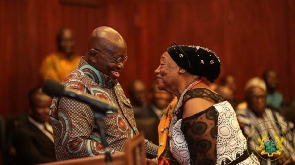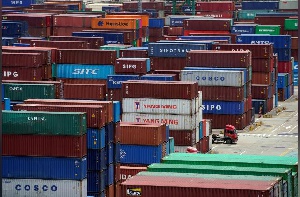There are an estimated 1,500 African Americans who have so far moved to Ghana since the country launched its Year of Return campaign in 2019.
This initiative of the government of Ghana – along with the U.S.-based Adinkra Group – is intended to encourage African diasporans to come to Africa to settle and invest in the continent, and it seems to have been accomplishing its aim.
But even more intriguing is the growing interest that many people of African descent have had in the initiative since its official launch by the Nana Addo Dankwa Akufo-Addo government of Ghana.
And while Ghana – the initiating country of this campaign, has not limited the return of African Americans to the country only, it has become one of the choicest destinations for many.
Why are people moving to Ghana?
The story of Diallo Sumbry, the Chief Executive Office of the Adinkra Group, and the author of the book, The Smart Ghana Repatriation Guide, is a case in point.
An American, Diallo traced his ancestry to the Fulani people of modern-day Nigeria, and the Ateka people of Gabon, but he has chosen to mostly live in Ghana.
Explaining why this is the case, he told DW News’ Eddy Micah Jr that he has come to love the peace and hospitality of the people of Ghana.
In fact, he added, while America provides him with opportunities as well, he prefers the challenge that he gets exploring same in Ghana, especially because it feels more welcoming being around people who look like him.
“I left for peace of mind, I left for better opportunities and I can’t say that I know, but I feel like I have a better chance of being killed by gun violence in Washington, D.C., than I do in Ghana, and that’s not because I’m involved in things that are involved in gun violence; it’s just a part of what happens in America.
“I feel like I’m less likely to be harassed and have bodily injury by the police while I’m here. I also think there are industries and opportunities that people of African descent and it’s documented historically have been locked out of, that are open to us here in Ghana.
“Of course, the cost of living is lower, and one of the simple facts that people remark, and these are people of high regard – whole bunch of superstars coming to Ghana, is Black people have been to a place that everybody looks like them and just thin k about the psychological effects of being a place where everybody looks like you. That alone,” he stated.
But Diallo Sumbry is quick to admit that the success of African Americans moving to Ghana isn’t always the more popular move.
He admits that the cultural dynamics between the lifestyles of people looking to relocate, and the inherent cultural norms of Ghana, make it sometimes difficult for people to fit in properly.
“One of the things that I’ve seen, and I don’t necessarily have the data to back this stuff, and somebody can challenge it, but I feel like I may have seen more failure stories than success stories, and I think that has to do with cultural orientation.
“Ghana is a place that is very proud of its cultures, that has a lot of different cultures, and cultural norms here are interweaved into everything: into business, into everyday lives, so, it’s like everybody here is very welcoming, polite, and will greet you, but once you move and spend more time here, you’ll find that it’s not as simple…” he said.
The best way out, he added, is for people to carefully study the land and its people because “if you’ve not had an appropriate cultural orientation and you haven’t spent a lot of time learning the land, I think you’re going to have more challenges than the average person may have spent time learning that.”
Tonya Saafir-Ankomah, an African American lawyer who has also moved to Ghana, agrees.
She also told DW News that the safety nets that exist in Western countries, where a lot of these people of African descent come from, are non-existent in Ghana.
This is something she continues to conscientize people looking for resettlement in Ghana.
But she has also been able to identify another equally effective safety net.
“Here, you’ve got to have money, so, I tell everybody that when you’re coming here, you should have a stable source of income to sustain yourself. Because, there are no safety nets like what we’re accustomed to in the West.
“So really, that’s why family is very important here and being connected to someone because that is the social safety here; your friends and family,” she explained.
About the Year of Return, Ghana 2019 (available via visitghana.com)
The “Year of Return, Ghana 2019” was a major landmark marketing campaign targeting the African–American and Diaspora Market to mark 400 years of the first enslaved African arriving in Jamestown Virginia. The Ghana Tourism Authority (GTA) under the auspices of the Ministry of Tourism, Arts and Culture, led the project in collaboration with the Office of Diaspora Affairs at the Office of the President, the Panafest Foundation, and the Adinkra Group of USA.
The Year of Return sort to make Ghana the focus for millions of African descendants reacting to their marginalisation by tracing their ancestry and identity. By this, Ghana became the beacon for African people living on the continent and the diaspora.
The United States Congress had, in 2018, passed an Act H.R. 1242 – 400 Years of African-American, which was in itself a historically significant milestone. Ghana being the gateway to Africa capitalised on its unique position as the location for 75 percent of the slave dungeons built on the west coast of Africa. The favourable government policy of making it a national priority to extend a hand of welcome back home to Africans in the diaspora served as the catalyst for the campaign.
Currently, there are still numerous imposing European forts and castles harbouring harrowing reminders of an intense and complex history of the Trans-Atlantic slave trade in our land over centuries. This on its own has made Ghana the focus for millions of African descendants.
Meanwhile, watch the latest SayItLoud episode on GhanaWeb TV below:
Share your news stories and ideas with GhanaWeb

AE/OGB
General News of Friday, 21 April 2023
Source: www.ghanaweb.com













